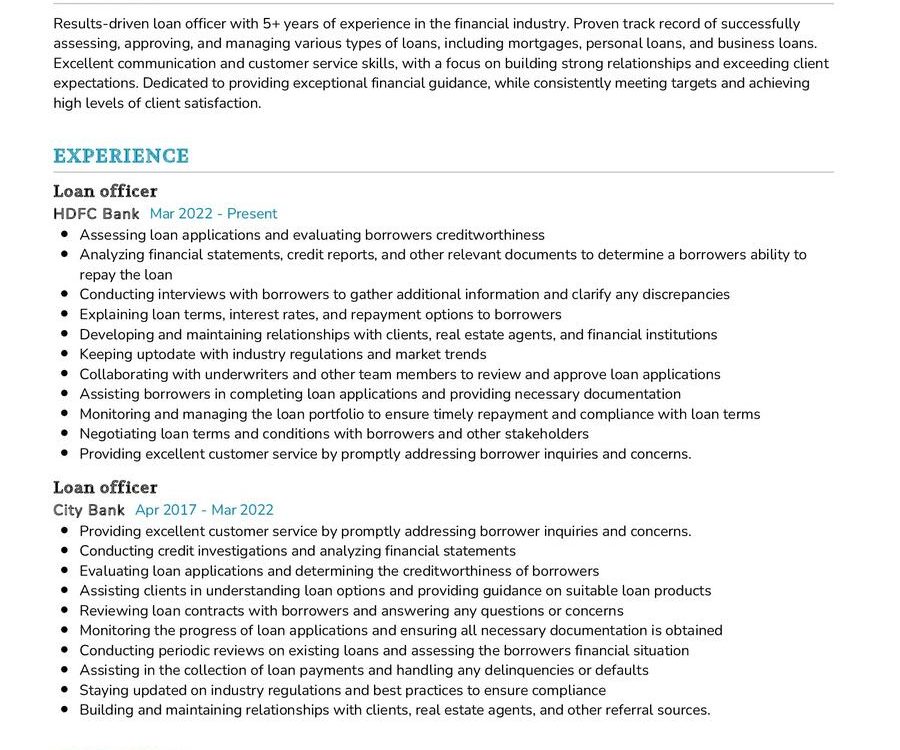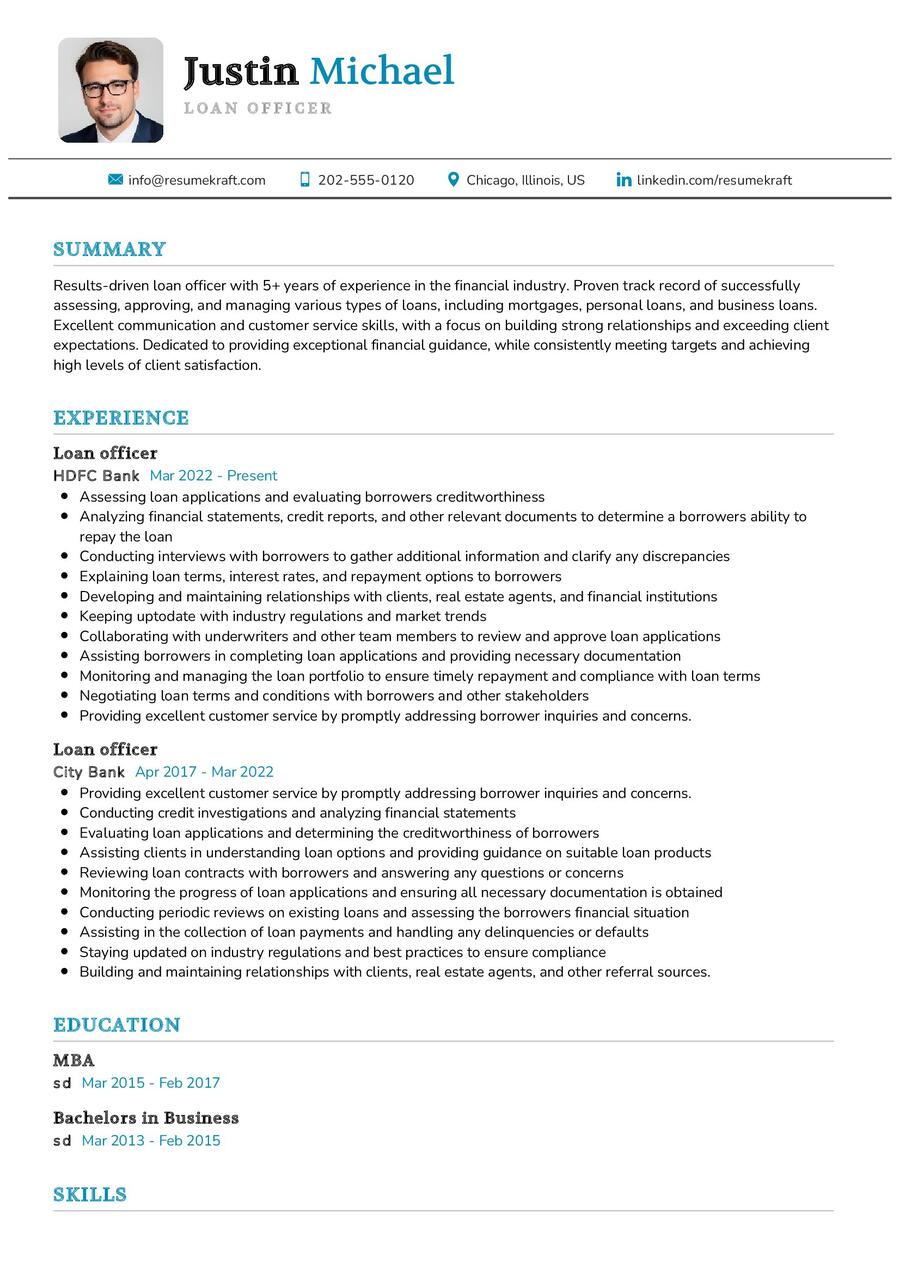Understanding the Crucial Role of a Loan Officer
In today’s dynamic financial landscape, the role of a Loan Officer is integral to the success of both individuals and businesses. This position requires a unique blend of financial acumen, interpersonal skills, and a deep understanding of lending processes. Let’s explore the multifaceted responsibilities of a Loan Officer, a role that goes beyond the surface of loan transactions, delving into the realms of financial guidance and client relationships.
Key Responsibilities of a Loan Officer
A Loan Officer plays a pivotal role in the lending process, acting as a bridge between financial institutions and borrowers. The responsibilities associated with this role are diverse and demand a combination of technical expertise and interpersonal finesse. Here’s a detailed look at the key responsibilities:
- Evaluating loan applications, considering factors such as creditworthiness, income, and financial stability.
- Guiding clients through various loan options, explaining terms, conditions, and repayment plans in a clear and understandable manner.
- Conducting thorough financial analyses to assess risk and ensure compliance with lending regulations.
- Cultivating and maintaining relationships with clients, real estate agents, and other industry professionals.
- Negotiating loan terms and conditions with borrowers and collaborating with underwriters to secure approval.
- Staying updated on market trends, interest rates, and changes in lending policies to provide informed advice to clients.
- Assisting clients in gathering necessary documentation and ensuring a smooth and efficient loan application process.
Qualifications and Skills Required for a Loan Officer
Becoming a successful Loan Officer involves meeting specific qualifications and developing a diverse skill set. Here are the essential requirements for aspiring Loan Officers:
- Bachelor’s degree in Finance, Business, or a related field.
- Strong understanding of financial principles, including lending practices and risk assessment.
- Excellent communication and interpersonal skills to build rapport with clients and stakeholders.
- Attention to detail and analytical abilities for accurate evaluation of financial documents.
- Knowledge of relevant regulations and compliance standards in the lending industry.
- Sales and negotiation skills to effectively navigate loan terms with clients and underwriters.
- Adaptability to market changes and the ability to thrive in a fast-paced, dynamic environment.
Crafting an Impactful Resume for a Loan Officer Position
Your resume is your first impression on potential employers, and as a Loan Officer, it should reflect your expertise and ability to handle financial responsibilities. Here are some tips to enhance your Loan Officer resume:
- Highlight successful loan transactions, emphasizing the positive outcomes and satisfied clients.
- Showcase your ability to navigate complex financial analyses and provide tailored financial solutions.
- Include any relevant certifications or training programs related to the lending industry.
- Quantify your achievements with specific numbers, such as the total value of loans processed or percentage increase in client satisfaction.
- Tailor your resume for each application, aligning your skills and experiences with the specific requirements of the job.
Loan Officer Resume Summary Examples
Your resume summary is a snapshot of your career, providing employers with a quick overview of your qualifications. Here are some examples tailored for Loan Officers:
- “Results-driven Loan Officer with a proven track record of closing complex loan transactions and exceeding sales targets.”
- “Experienced Loan Officer specializing in mortgage lending, adept at guiding clients through the loan application process with clarity and expertise.”
- “Detail-oriented Loan Officer with a strong analytical background, ensuring accurate risk assessment and compliance with industry regulations.”
Each summary serves as a gateway to your professional journey, inviting employers to explore the depth of your expertise.
Education and Professional Development for Loan Officers
Your educational background and commitment to continuous learning contribute significantly to your success as a Loan Officer. Here’s how you can present your educational journey in your resume:
- Bachelor of Science in Finance, XYZ University, a solid foundation in financial principles, 2015.
- Loan Officer Certification Program, ABC Institute, enhancing skills in risk assessment and loan processing, 2017.
- Continued professional development through workshops and seminars on evolving lending practices and regulations.
Your commitment to ongoing education demonstrates your dedication to staying at the forefront of the lending industry.
Loan Officer Skills for Your Resume
As a Loan Officer, your skill set is your toolkit for success. Here are the key skills that set you apart in the lending industry:
Soft Skills:
- Effective communication and relationship-building skills for client interactions.
- Negotiation abilities to secure favorable loan terms for both clients and financial institutions.
- Attention to detail to ensure accurate evaluation of financial documents and compliance with regulations.
- Adaptability to navigate market changes and evolving lending practices.
- Time management skills to handle multiple loan applications simultaneously.
Hard Skills:
- Proficiency in financial analysis and risk assessment for sound decision-making.
- Knowledge of lending regulations and compliance standards to ensure ethical practices.
- Sales and marketing skills to attract and retain clients in a competitive market.
- Technological proficiency in relevant loan processing software and financial tools.
- Customer service orientation to prioritize client satisfaction throughout the lending process.
Each skill in your arsenal contributes to your effectiveness as a Loan Officer.
Common Mistakes to Avoid in Your Loan Officer Resume
Crafting a compelling resume requires avoiding common pitfalls that can hinder your chances of landing your dream job. Here are some mistakes to steer clear of:
- Avoid using generic language; tailor your resume to highlight your unique strengths and experiences.
- Focus on showcasing your achievements rather than listing job duties for a more impactful narrative.
- Do not underestimate the power of a cover letter; use it to tell your story and connect with potential employers.
- Balance technical language with layman’s terms to ensure your resume is accessible to a diverse audience.
- Thoroughly proofread your resume to maintain a professional image and avoid errors.
Each mistake is a potential roadblock; sidestep them to create a resume that is authentic and compelling.
Key Takeaways for Your Loan Officer Resume
As you shape your Loan Officer resume, keep these key takeaways in mind:
- Emphasize your ability to navigate complex financial analyses and provide tailored solutions to clients.
- Showcase your effective communication skills in building lasting relationships with clients and industry professionals.
- Highlight your commitment to ongoing education and staying updated on industry trends.
- Quantify your achievements with specific numbers to demonstrate the tangible impact of your work.
Remember, your resume is not just a document; it’s a canvas where you paint your career story, illustrating your growth, expertise, and dedication as a Loan Officer. Best of luck!
Finally, feel free to utilize resources like AI Resume Builder, Resume Design, Resume Samples, Resume Examples, Resume Skills, Resume Help, Resume Synonyms, and Job Responsibilities to create a standout application and prepare for the Loan Officer job interview.


